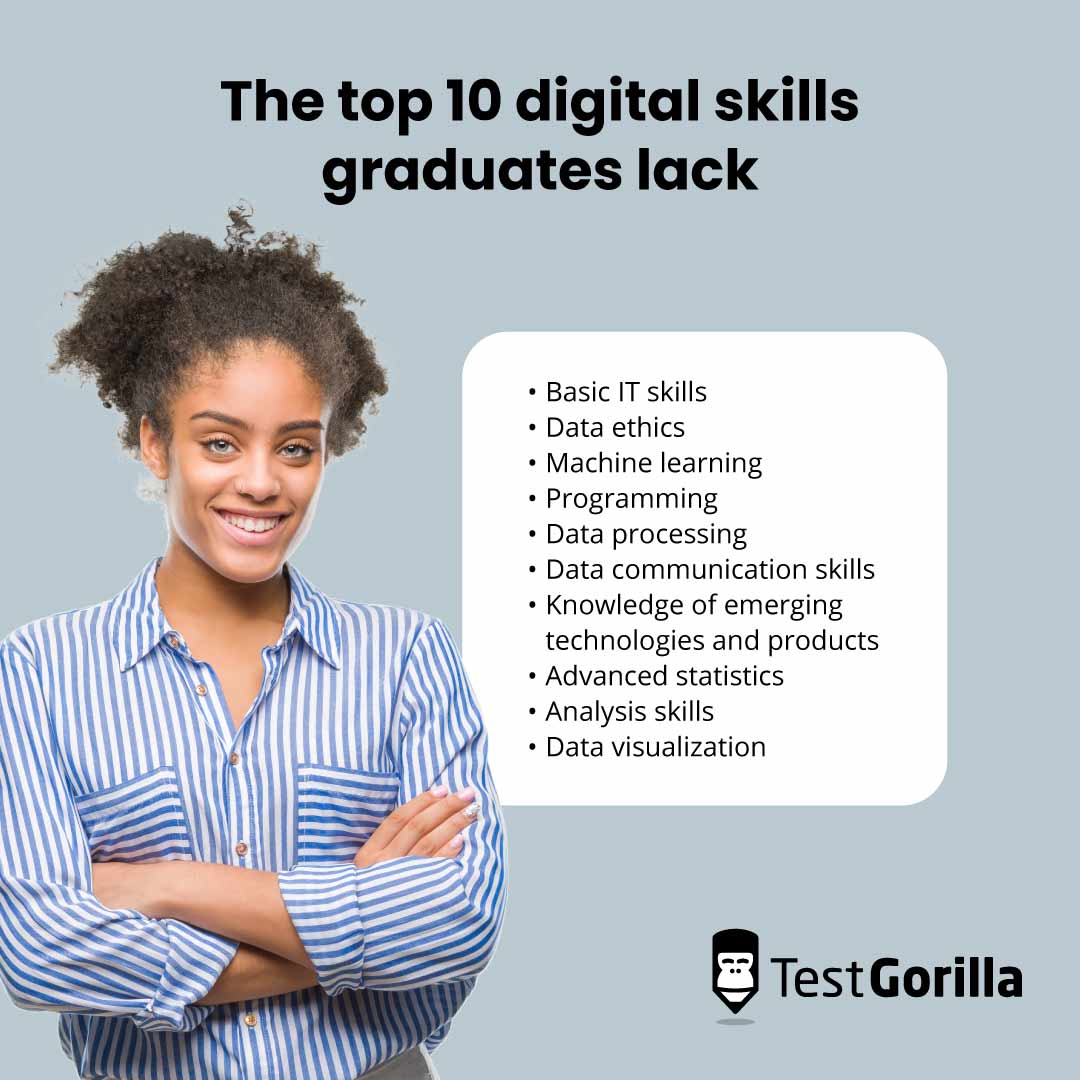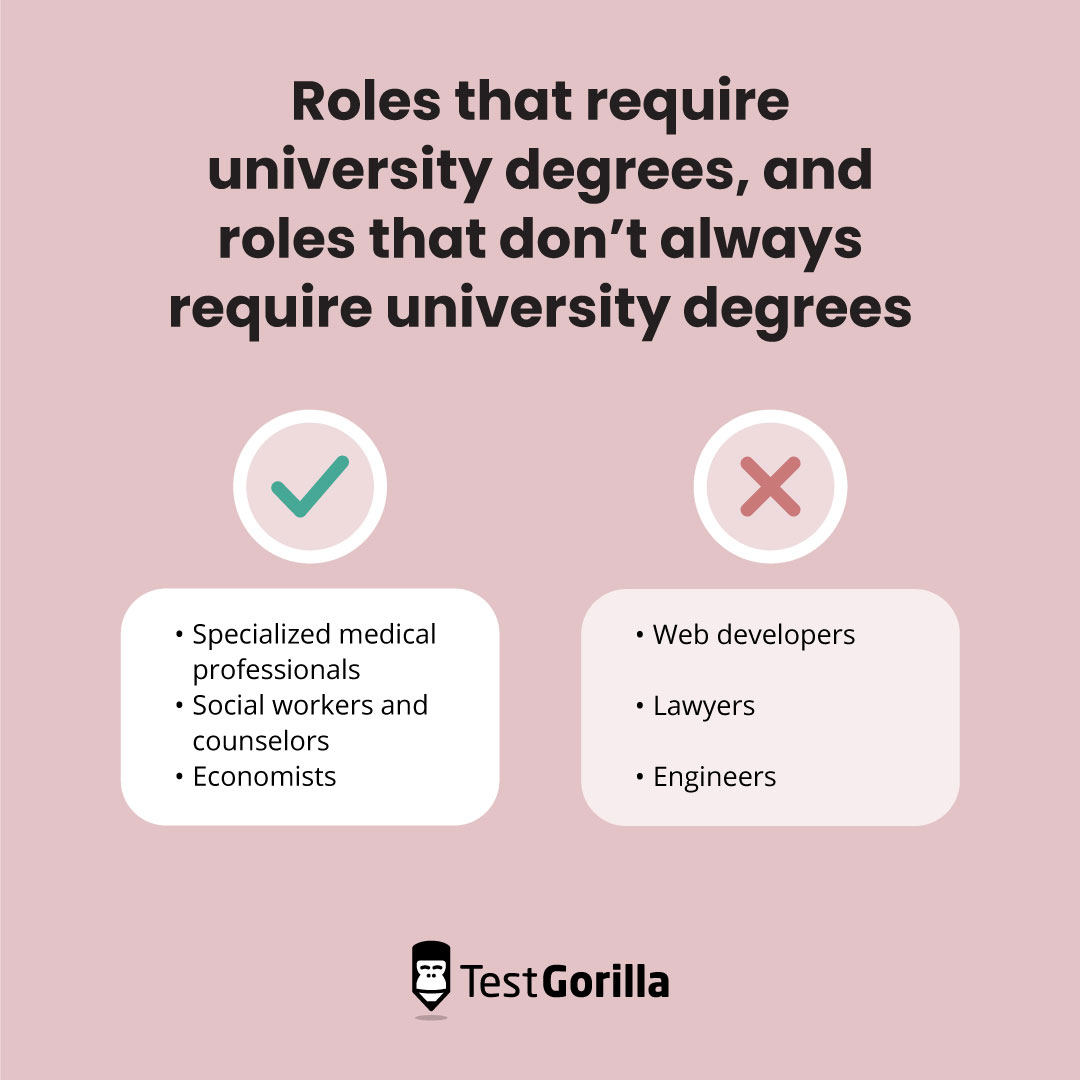The truth about degree requirements: The roles you need them for – and the ones you don’t
Degree requirements are one of the aspects of traditional hiring that employers find the most difficult to throw out. And hey, we understand why.
They’ve been around for years, they make the screening process quicker and (seemingly) easier, and many advanced skills that employers expect only come from university study, like advanced accounting.
However, many employers are now throwing out these old tools in favor of data-driven methods, like skills-based hiring.
What is the truth about degree requirements, then?
Are they useful screening tools, or are they an obstacle to making the right hire? Is there even a place for them in modern hiring?
In this blog, we answer these questions and more, breaking down which jobs do require degree training – and which ones don’t.
Let’s start by discussing what employers look for when they ask for a degree when hiring.
Table of contents
- Why is a degree needed for a job?
- The case for degree requirements
- The case against degree requirements
- Which roles require university degrees?
- Which roles don’t require university degrees?
- The missing piece: Skills-based hiring
- Use skills testing to hire highly-skilled candidates whether a degree is required or not
- Sources
Why is a degree needed for a job?
Employers usually use degree requirements during pre-employment screening as a way to eliminate candidates who could be less qualified.
The logic is that a candidate having a university degree on their resume proves they have the basic digital and professional skills to perform the role at hand, including:
Presentation skills
Motivation and the ability to work independently
Communication and collaboration skills
Proficiency in Excel and Microsoft Office
Depending on the discipline and the role, an employer could also look for a degree as a sign that the candidate has an in-depth understanding of the field.
Degree requirements are in widespread use by employers today.
In 2018, research by Georgetown University predicted that more than a third of job openings by 2020 would require at least a bachelor’s degree and 30% would require some college or an associate’s degree.
In reality, the figures could be even higher.
In 2021, more than nine out of 10 employers used recruitment management systems to filter or rank potential employees. Most of them used proxies, including college degrees, to denote skills.
To better understand why degree requirements are so widespread and where the assumptions that underpin them come from, we need to take a quick look at their history.
A brief history of degree requirements
The history of college degrees as a proxy for skills begins in the late 20th century and the advent of digital computing.
Along with the invention of the Internet, this development shifted Western society from an industrial one to being driven by what Peter Drucker, an economist, called “knowledge work”: work that required employees to “think for a living.”[1]
Thanks to their historical associations with knowledge production, universities became the hub for providing workers with the skills for this new landscape.
Employers started adding degree requirements to job ads, and the demand for degrees increased quickly, with events like the 2008 recession driving even more young people into higher education.[2]
Despite increasing numbers of graduates entering the workforce, employers suffer from skills shortages. A skills shortage is a type of skills mismatch in which a skills gap visible in a company is also present across the larger workforce.
In 2022, three-quarters of companies worldwide had a sixteen-year high of shortages concentrated in digital skills areas.[3]
There could be only one outcome for universities.
The degree reset
The “degree reset” is a term used to describe the shift away from degree requirements as a hiring tool. It is occurring in response to the failure of higher education to deliver the skills that employers need for the digital economy.
The recognition that the boom in degree requirements in hiring led to “degree inflation,” in which jobs that had never previously required degree training now used degrees as a barrier for entry, drives this degree reset.
For example, in 2015, 67% of production supervisor jobs required a college degree, even though only 16% of working production supervisors had one.[4]
In response to the lack of skills mentioned above, many employers have removed the demand for degrees from their job ads.
Almost half (46%) of middle-skill and a third (31%) of high-skill jobs experienced degree resets between 2017 and 2019.
The US government is now advising all departments to scrap degree requirements for IT professionals and any other roles that don’t require specific licensing.
The case for degree requirements
There is ample evidence to suggest that degrees are not requirements for most roles. But is scrapping degree requirements always a good idea?
Do they have any merit as tools for screening or for candidate selection?
Here are the arguments in favor of using degree requirements in your recruitment.
In some cases, they’re the only way to get the required knowledge or skills
There’s no getting around the fact that, in some cases, universities are the only places where students can get the accredited training required for a role.
Doctors are an obvious example. To practice medicine, doctors must have studied and passed their exams at an accredited medical school.
For some roles, it could not just be the discipline your candidate studied that makes them a good fit for the role, but the level to which they studied it.
If you’re hiring someone for a complex research or science-related role, you likely want a candidate with experience in in-depth research procedures.
Your ideal candidate would have put their research behind them already.
Participating in doctoral research can also indicate that a candidate has:
A complex understanding of the research in their field
Extensive academic contacts in their discipline
Knowledge of best practices for applying their skills
Most degrees do give graduates valuable soft skills
Hardcore skills-based hiring purists may say that a degree gives you zero information about a candidate, but that’s not always true.
If a candidate has completed a four-year degree, that does tell you something about their skills.
Even non-technical degrees that aren’t remotely related to the role at hand give graduates hard and soft skills that are useful in the workplace.
For instance, liberal arts programs teach numerous soft skills, including:
Oral communication
Critical thinking
Ethical judgment
Effective teamwork
Written communication
All of these are increasingly useful to employers because soft skills are hard to replicate or replace with automation.
By some estimates, two-thirds of all jobs will be soft-skill intensive by 2030, growing two and a half times faster than jobs in other skill areas.
Soft skills are also central to leadership. One study by consulting giant McKinsey found that there are 20 leadership traits connected to organizational performance, all of which are related to four soft skills:[5]
Insight: for instance, offering a critical perspective on a business issue
Integrity: giving praise and role modeling organizational values
Courage: championing desired changes and remaining calm in the face of uncertainty
Agility: motivating teams, recovering from failures, and maintaining positivity
With these benefits of a degree in mind, what are the arguments against using degree requirements in hiring?
The best insights on HR and recruitment, delivered to your inbox.
Biweekly updates. No spam. Unsubscribe any time.
The case against degree requirements
The above arguments show that having a degree can inform the skills a candidate brings to your workforce.
However, they do not prove that having a degree requirement automatically screens would-be workers with those skills.
Here’s why.
They’re easy to lie about
The uncomfortable truth is that lying on resumes is exceptionally easy.
More than half of jobseekers lied on their resume in 2022 – and that’s just the ones who admitted it.
Many hiring gurus even tell candidates to lie to help their resumes stand out to applicant tracking software (ATS), recommending:
Keyword stuffing, when candidates hide the keywords used in the job ad in the background of their resume so the ATS prioritizes their application.
Exaggerating the level of responsibility they held in previous roles.
Embellishing their proficiency in certain skills. For example, listing themselves as “fluent” in a language they haven’t learned since high school.
You could think that these kinds of mistruths would surely come up in a reference check, and if you’re thorough, you might be right.
Indeed, 87% of employers conduct reference checks as part of pre-employment screening, but we’d be willing to bet that most of these checks look at employment history rather than educational references.
Besides, if a candidate gets all the way through to reference checks based on forged educational achievements, you waste a lot of time and resources on them by the time you realize the mistake.
They’re rarely the only way to get valuable knowledge and skills
Even if a candidate does have the degree they say they do, that doesn’t mean degrees are the only way to get those skills.
Skills-based learning is on the rise, with more and more candidates electing to gain skills through avenues such as:
Community college
Workforce training
Certification programs
Military service
On-the-job training
These candidates are known as STARs – or employees “skilled through alternative routes” – and they make up a significant chunk of today’s workforce: 60% of American workers over 25 do not hold a four-year degree.
Not only are you cutting yourself off from a large pool of talent by ignoring STARs, but you’re also reducing your chances of increasing diversity in your organization.
Adding a four-year degree requirement to a role automatically disqualifies 76% of Black and 83% of Hispanic workers because bias holds back many people of color in the education system.[6]
It also unfairly penalizes candidates from low-income backgrounds because just one-fifth of students from low-income families make it to college.
Not all degrees are created equal
At the screening stage, degree requirements are mostly a box-checking exercise, with any degree being good enough to pass the test. Conducting this kind of check doesn’t tell you:
What specific skills a candidate learned in their program
Whether these have any overlap with the role you’re advertising for
Whether they have retained these skills since graduating
How they performed in different skills areas
This information is perhaps especially true the more time has passed since the candidate completed their degree.
If someone completed a computer science degree 10 years ago, you wouldn’t expect those skills to be sharp or relevant now, and the same goes for many other skill sets.
Any degree is not right for every job
Another issue with degree requirements in their broadest form is that the candidate could have studied an entirely different discipline from the role they’re applying for.
The degree a student chooses when they’re 18 or 21 is not always related to the career that best suits them at 30.
Changing your mind isn’t necessarily bad – diversity of thought is a good thing on teams, after all.
However, the underlying false assumption about degrees is that any degree gives graduates the professional skills required for every job.
More than a third of graduates say they hardly use the skills they learned in college, and one-fifth say their college didn’t teach them the business skills they needed.
This disconnect is partly because the skills required for most jobs are constantly changing. More than half of hiring managers expect technologies like workplace automation to change the skills they need from employees.
Automation is a particular problem when it comes to digital skills. For example, employers in the UK believe that the top 10 digital skills graduates lack are:
Basic IT skills
Data ethics
Machine learning
Programming
Data processing
Data communication skills
Knowledge of emerging technologies and products
Advanced statistics
Analysis skills
Data visualization
These lacking skills are closely related to our next point.
They’re not a direct measure of skills
At best, a degree requirement is a proxy for skills, not a direct measure of them.
It does not tell you with any precision which skills a candidate learned, or how well they’ve retained these skills since graduating. For this reason, they’re not a good indicator of job success.
There’s even evidence that a degree could make a candidate a less reliable hire.
Harvard Business School’s analysis of 26 million job postings revealed that college grads had lower engagement rates and a higher turnover rate than their non-college-educated counterparts.[4]
The risks of hiring using degree requirements outweigh the benefits of including them for most roles. However, some roles do require a university education.
Which roles require university degrees?
We’ve seen that degree requirements, when used indiscriminately, damage your diversity initiatives, cut out large swathes of the workforce, and could contribute to making mis-hires.
As we’ve said, however, some roles do require degree training beforehand.
Frequently, these roles require a strong base of knowledge or research for candidates to know how, when, and why to apply their technical skills.
They are often also roles in which one cannot legally practice without going through government-accredited training and the required training exclusively takes place at colleges.
Here are some examples of these types of roles.
Specialized medical professionals
The first type of role in which a degree is an absolute necessity is in the case of specialized medical professionals. This group includes:
Doctors
Nurses
Dentists
As previously mentioned, degrees like these involve disciplines that are tightly controlled by the government to keep the public safe.
For example, in Canada, the Committee on Accreditation of Canadian Medical Schools (CACMS) is a public body that maintains standards in medical education and ensures that practicing physicians have input on what incoming practitioners learn.
Social workers and counselors
Social workers and counselors are other examples of a profession that requires college training, particularly if they are working in sensitive environments such as schools.
These jobs need degrees partly because of the bedrock understanding of psychological research necessary to practice. It is also often necessary to specialize in a certain area, such as child psychology, which requires extensive study.
Another reason these cases require a degree is that candidates must understand the law required to practice these disciplines.
For instance, a social worker working with young children moving through the care system would need to understand:
Child protection laws and their own duty of care
Family law and how the legal system works concerning family separation
The fostering and adoption process
Economists
Finally, economists monitor past and present economic developments and trends, and use mathematical modeling to predict potential outcomes.
Understanding the economy requires in-depth knowledge of economic theory and data modeling that would-be workers can only learn through university study.
However, as we said above, to compare candidates’ skills for an economist position, you would still want to test them on skills such as:
Exploratory data analysis
Fundamentals of statistics and probability
Financial math
All of these and more tests can be found in our test library.
Which roles don’t require university degrees?
In truth, the answer to this question is most of them.
Even roles that require significant technical skills don’t necessarily require a university degree. In many cases, candidates can gain these skills through a professional qualification from a trade school or on-the-job training.
Some of the examples could surprise you.
Roles that don’t always require university degrees – to master skills or to legally practice – include:
Web developers. You may think that to hire an expert developer, you need to look at the graduates of top colleges, but many brilliant web developers are entirely self-taught.
Lawyers. In most states, would-be lawyers do require a Juris Doctor (JD) degree to practice law. However, in California, Vermont, Virginia, and Washington, you do not need a JD to pass the bar exam. In many countries, it is possible to achieve the required learning through on-the-job training, for instance as a paralegal.
Engineers. In the US, it is difficult to advance in many engineering fields without an accredited degree that enables engineers to become licensed. However, many entry- to mid-level roles do not require them. Internationally, engineers can become licensed through alternative routes, such as apprenticeships.
The missing piece: Skills-based hiring
You leave a lot to chance when you use degree requirements for all roles. And that’s why the demand for skills-based hiring exists.
Skills-based hiring supports and, in many cases, replaces degree requirements with direct observation and comparison of the candidates’ skill sets.
Here’s why it’s the way forward.
Skills testing verifies skills and measures proficiency
Skills testing offers a more efficient alternative to resume evaluation for would-be workers and recruiters because it offers a way for employers to directly measure skills a resume can only show.
All would-be workers’ data is automatically sorted based on their performance in skills tests. The recruiter can tailor skills tests to the role they’re applying for.
They verify that the skills are present and enable you to observe and compare the candidates’ level of proficiency more easily.
Skills tests make it easier to assess candidates’ strengths and weaknesses accurately. Don’t just take our word for it: Our survey found that 92.5% of organizations saw a reduction in mis-hires after switching to skills-based hiring.
The advantages of skills-based hiring are clear, especially when compared with using degree requirements. In these cases, recruiters are forced to rely on bias to help them guess which candidate has the better skills.
For example, when faced with two similar candidates, a recruiter could base their decision on the one who attended a more prestigious university.
Picking that candidate is a poor way to judge whose skills are more advanced, especially when hiring for an international team. You may not have a working knowledge of the educational landscape in your target country and no way of knowing who has the “better” background.
Removing resume screening limits unconscious bias
Even if you aren’t consciously leaning on assumptions about would-be workers to make decisions, you could still have unconscious biases.
Data supplied by skills testing enables you to eliminate them and back up your decisions with data.
A recent study found that applicants with White-sounding names were 9% more likely than those with Black-sounding names to receive responses from employers – even for the same applications.
By contrast, skills-based hiring improves diversity.
In the case of gender diversity, an analysis of more than 2,000 successful hires found that the number of women hired into senior roles jumped by nearly 70% when employers used skills-based techniques.
Screen candidates based on skills, not assumptions
We know replacing resumes with skills testing might sound scary, but the good news is that not requiring degrees doesn’t mean you won’t still get university-educated employees.
Using skills-based hiring methods means that if a candidate has the best skills for the role, they’ll make it through your screening process regardless of where they got those skills from, which doesn’t exclude college-educated applicants.
At TestGorilla, we use skills-based hiring techniques, and yet many of our subject matter test experts have advanced degrees.
For example, Azusa H., who is the subject matter expert for our Japanese Proficient/C1 test, has a Bachelor’s degree in special education and a Master’s degree in management and administration of educational centers.
On the rare occasion you’re hiring for a role with necessary degree requirements, skills testing becomes arguably even more important.
Skills tests can verify that a candidate has the skills their degree suggests and also will help you compare them with other would-be workers.
To add to the certainty that candidates have the best skills for the role, skills testing also drastically reduces the opportunities for candidates to lie. The impact of cheating on skills-based hiring is minimal thanks to extensive anti-cheating measures, for example:
Retiring questions after a certain number of uses
Rotating questions between candidates
Using online proctoring software to ensure candidates aren’t cheating during the test
Use skills testing to hire highly-skilled candidates whether a degree is required or not
In this blog, we’ve discussed why degree requirements are too blunt an instrument to use in hiring for most roles.
They’re easy for would-be workers to lie about, they don’t directly measure skills, and they unfairly penalize many great candidates.
Even for the roles that do require them, you need a way of observing the candidates’ skills directly to make the best hire – and skills-based hiring is the way to go.
To learn how to get started with skills-based hiring, read our guide to pre-employment skills testing.
If you have a specific skills deficit you’re trying to fill, you can use skills-based hiring to fix skills gaps.
Whatever the nature of your open role, our role-specific skills tests can help you find the right skills fit, whether a university degree is required or not.
Sources
Drucker, Peter F. (September-October 1992). “The New Society of Organizations”. Harvard Business Review. Retrieved April 25, 2023. https://hbr.org/1992/09/the-new-society-of-organizations
Parker, Clifton B. (March 6, 2015). “The Great Recession spurred student interest in higher education, Stanford expert says”. Stanford News. Retrieved April 25, 2023. https://news.stanford.edu/2015/03/06/higher-ed-hoxby-030615/
“The Talent Shortage”. (2023). ManpowerGroup. Retrieved April 25, 2023. https://go.manpowergroup.com/talent-shortage
Fuller, Joseph; Raman, Manjari. (October 2017). “Dismissed by Degrees”. Harvard Business School. Retrieved April 25, 2023. https://www.hbs.edu/ris/Publication%20Files/dismissed-by-degrees_707b3f0e-a772-40b7-8f77-aed4a16016cc.pdf
Ritter, Ron; Ruggero, Ed. (October 2, 2017). “Leadership in innovation needs innovation in leadership”. McKinsey & Co. Retrieved April 25, 2023. https://www.mckinsey.com/capabilities/operations/our-insights/leadership-in-innovation-needs-innovation-in-leadership
“Highest Educational Levels Reached by Adults in the U.S. Since 1940”. (March 30, 2017). United States Census Bureau. Retrieved April 25, 2023. https://www.census.gov/newsroom/press-releases/2017/cb17-51.html
You've scrolled this far
Why not try TestGorilla for free, and see what happens when you put skills first.





















